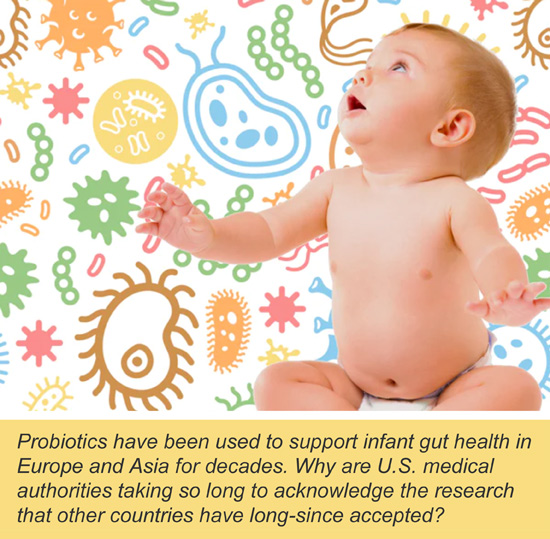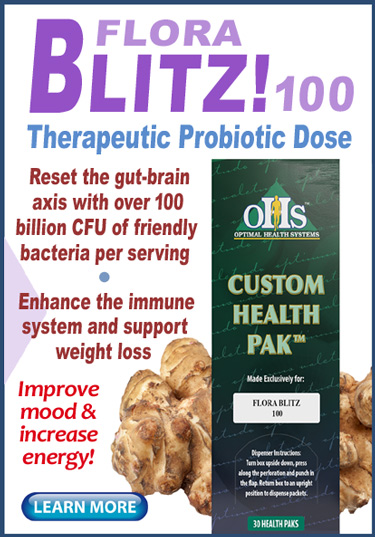Though the health benefits of probiotics are now widely accepted, the use of probiotics for infants is still being debated—at least by medical “authorities.”
Forty years ago probiotics were relegated to the status of snake oil by the medical establishment in the U.S. This despite the fact that they were widely used in Europe. Today this same medical establishment prescribes probiotics for numerous health conditions.
Understanding this history can help predict the future: As evidence mounts on how infants benefit from probiotics, and as parents continue to ask about them, the medical establishment will eventually acknowledge the vital part they play in the health of both mothers and babies.
In fact, it’s already happening.
Going mainstream
In April 2018 the science division at National Public Radio (NPR) delved into the sensitive subject in an article highlighting the University of California, Davis Children’s Hospital—one institution that does prescribe probiotics to infants.
One of the conditions where probiotics are prescribed is premature births.
According to NPR: “At UC Davis Children’s Hospital, all preemies born under a certain birth weight are now given probiotics. It’s become a common practice in other countries including Australia, Japan, Sweden and Finland… but in the U.S., giving probiotics to preemies is controversial, with some doctors calling for more research.”
According to Dr Mark Underwood, chief of Pediatric Neonatology at UC Davis and a professor of pediatrics, when probiotics are given to premature babies the chance of getting a common type of inflammation called Necrotizing enterocolitis goes down. He knows this for sure as he’s conducted his own research.
2017 study
To conduct the the study Underwood and his colleagues recruited 68 moms and healthy babies. All of the babies were breastfed. Half of the babies were given probiotics during the first month of life. The other half—the control group—did not receive probiotic supplements.
The researchers reported finding an increase in the number of good bacteria among the babies given the probiotic.
Using fecal samples, researchers documented a 79 percent increase in levels of bifidobacteria, a type of bacteria that is thought to be protective. At the same time, Underwood and his team also measured a decrease in potentially harmful bacteria such as clostridium in the gastrointestinal tracts of the babies.
How many years, how many studies before probiotics become
“infant accepted”?
• A 2014 study found that there was a health and financial benefit of treating healthy babies in their first three months with one specific type of probiotic. This helped to avoid the onset of GI conditions, like reflux and constipation, as well as reduce overall crying time. [Source.]
• A 2011 study connected a reduction in colic symptoms with the use of probiotics. The study examined the results of breastfed infants who were administered five drops of a probiotic supplement 30 minutes prior to feeding for 21 days. The study found that the infants using the supplements cried less than those not using the supplement. [Source.]
“One potential advantage of the bifidobacteria is that these bacteria can help lower the pH inside the intestines,” noted Underwood. “And a lower pH allows more healthy bacteria to thrive.”
2022 studies
In early 2022 a meta-analysis conducted in Spain found a reduction of 73% in gastrointestinal infections in babies delivered by Cesarean section when they were provided a probiotic regimen.
This is a promising finding since it is known that births by Cesarean section have a high likelihood of compromising immune system development of the newborn.
This happens because the surgical process disrupts the microbiota colonization process that occurs naturally through mother-to-infant transfer during vaginal delivery.
The researchers noted that this “microbiota disbiosyis” can be partly ameliorated by breastfeeding, when possible, but probiotic supplementing is an alternative strategy to improve immune response.
The meta-analysis included 173 healthy C-section infants pooled from three double-blind, randomized, controlled clinical trials. Results of the study were published in Frontier in Pediatrics in July 2022.
Study – mothers can take “supplements for two”
A study later in 2022 found babies benefited when probiotic supplements were given to their mothers.
“This study demonstrated that small amounts of maternally ingested bacteria could translocate to the infant gut via oral and entero-mammary routes in more than half of the mother infant pairs, suggesting it is feasible to nourish infants with bifidobacteria and possibly other probiotic bacteria via lactation,” the researchers wrote in Microbiome in November 2022.
To test the “bacteria transmission” effect the authors selected biomarker strains to track via transfer from mother-to-infant through breast milk.
Researchers recruited mother-infant pairs at the lactation stage, with mothers required to ingest a probiotic dry powder each day. The dose was ten times higher than normally recommended, but researchers noted this was crucial to enhance detection of the target strains.
Unfortunately the study did not include a control group as researchers were unable to recruit enough pairs due to constraints imposed during the Covid-19 pandemic. Still, the researchers noted that most mother-infant pairs (54.5%) contained the biomarker probiotic strains, so it was therefore “logical to postulate” that the probiotic strains gained access to the infant gut through breast milk.
– – –
Optimal Health Systems has provided quality probiotic products for over 20 years. The Optimal Health Systems product line includes both probiotic-only blends and probiotic-included products. Click links below to learn more.
• Flora Blitz 100
• Optimal Flora Plus
• 21-Day Blitz Challenge Package
• Exposure Protection Pak
• Natural Z Pak
• Optimal Defense
– – –
Sources: NPR.org “Probiotics For Babies And Kids? New Research Explores Good Bacteria”, MSphere/PubMed.org, Frontiers in Pediatrics, Microbiome.


